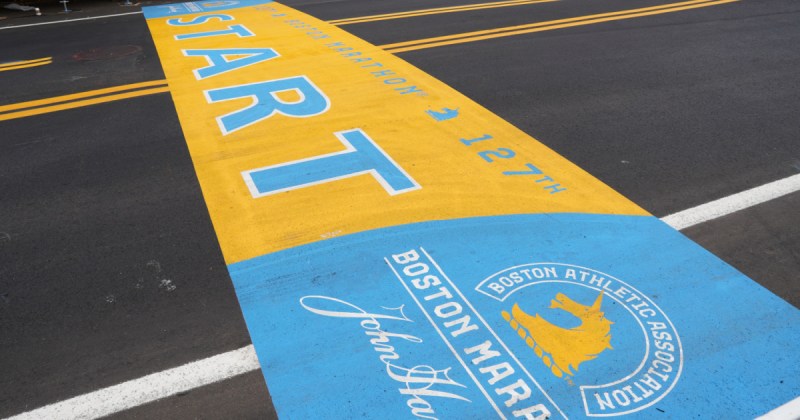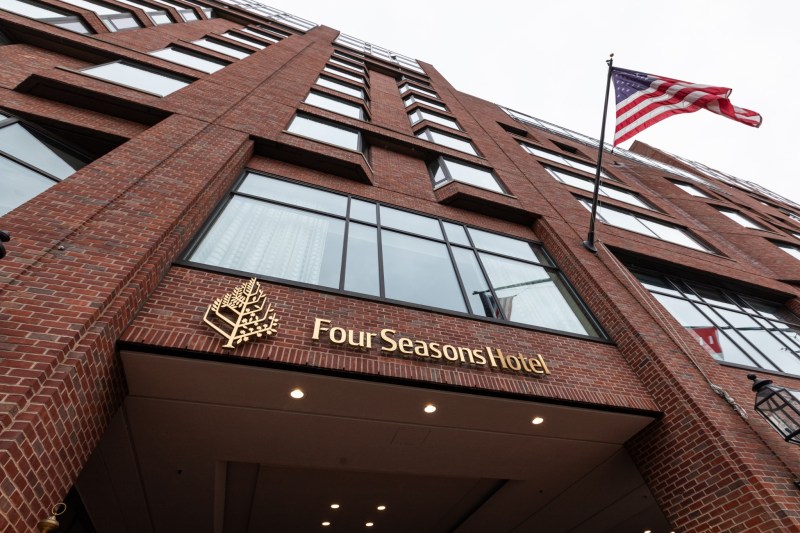Sure you’ve considered that a trip to Berlin is going to cost a bit with airfare, but do you really know the true cost of running a World Marathon Major? Is Boston more expensive to run than London? Let’s take a deeper dive in to the cost of chasing that Six Star Medal and of course why it’s still worth it for many of you!

What Does it Cost to Run the Boston Marathon?
Let’s break this down, just as an example, as if a runner from the Midwest was heading to Boston for race weekend.
For the purposes of our example, we’ll assume that we already own all of the necessary running gear for the day, but make sure you take that into consideration for your own calculations. Hello Nike Alphafly’s at $300 and a new racing kit because who doesn’t want to look extra great in your photos.
Costs for just the runner, which of course don’t include any previous races to get that Boston Qualifying time OR the additional amounts needed for charity.
- Entrance Fee: $250
- Airfare: $400
- Hotel Costs: $1600 (3 nights, near the finish line, you’ll see below it’s one of the more expensive cities)
- Transportation Costs: $125 (to and from the airport, incidental ride shares)
- Food: $350 (nine mid-range meals plus snacks)
- Boston Marathon Jacket and Swag: $180 (gotta have that jacket at $120)
- Photos: $50 (assuming you get some you’d like to buy)
Roughly $3,000 for just the runner.
Now this is just for the runner to go solo and many of us want to include our family in the whole experience of the weekend, so let’s take a second look at our total cost.
We’ll need to double the airfare and the meals, which then puts the weekend at closer to $3600 – $3800. And of course this goes up further if bring kids or other family members.
What Does it Cost to Run A Marathon?
Running a World Marathon Major increases your racing cost immediately. It’s a little like when you buy a cake and say it’s for a wedding, cha ching the price just went up.
Because the WMM’s are located in large cities, it increases the cost of everything. Registration fees are higher as they need to close down major roads, pay for more security and of course because they can with such a high number of entrants! This is closely followed by higher hotels, transportation and food.
Thus a regular marathon in your hometown might cost you $200 + your gear. Running one of our favorite Fall US Marathons that aren’t majors might be closer to $800 and a Major is likely going to be $1800+ depending on your flight.
Let’s break this whole thing down.
#1 World Majors Registration Fees
If you feel like the race fees keep rising, you aren’t wrong. It can easily cost nearly
These can vary a bit depending on the marathon and whether or not they charge resident/non-resident fees, but they top out at around $350.
This list gives resident fees first, then international fees.
- Tokyo Marathon: $140/$230
- Boston Marathon: $250/$250
- London Marathon: $110/$205
- Sydney Marathon: $250/$250
- Berlin Marathon: $235 (many charity entries are higher)
- Chicago Marathon: $245/$255
- New York City Marathon: $255 (NYRR)/$315/$358
You’ll want to check with the race on your specific types of entry, as those can vary, but these are the costs for lottery entries to these races.
Charity Runner Registration
The WMM’s all set aside about 10% of their spots for charity runners. These runners still have to pay the registration fee and as noted it’s often HIGHER than for those who get in via the lottery system.
Charity runners also have to raise anywhere from $5,000 to $10,000 depending upon the race and the charity. HOLY SMOKES!!
That’s a lot of extra work, but has also resulted in Billions, yes with a B, being raised for charity.
#2 Travel Costs
For many this is going to be the biggest chunk of expenses.
This will obviously depend on how far you have to go, whether you can drive or need to take a flight, and whether or not you live somewhere that’s somewhat easy to travel to and from.
Flying internationally is obviously going to up the ante as far as cost.
The average cost of a domestic flight in the U.S. in 2025 is around $305. Unfortunately, flying to the Majors if often more because you have no control over the dates AND are looking for flights when 50,000 runners plus family and friends are also looking for flights.
The average cost of an international flight from the U.S. to Europe in 2025 is anywhere between $400 and $1400.
The average cost of an international flight from the U.S. to Australia in 2025 is $800-$2200.
The average cost of an international flight from the U.S. to Tokyo is $800-$1500.
Hotel Costs
As with most of these categories, your hotel and/or Airbnb costs will depend on your style, your desire to be close to the finish line of the race, and your ability to fork over some serious cash.
Three-star hotel rooms in most of these cities will run between $250-$300 on a normal day, but could go up more than 50% due to demand on race weekends. You can mitigate these costs by staying further from the action – or you can go the opposite direction and really splurge on a 4-star hotel close to the finish line if you really want to soak it all in.
 Boston is the most expensive city in the States when it comes to hotel stays, and while a 3-star hotel runs around $300 on a normal day, it goes up to an average of $429/night in the city during marathon weekend.
Boston is the most expensive city in the States when it comes to hotel stays, and while a 3-star hotel runs around $300 on a normal day, it goes up to an average of $429/night in the city during marathon weekend.
Airbnb costs tend to rise along with hotel costs when places are in-demand, so you can expect similar rates there.
Additional Transportation Costs
These can be hard to estimate, because fares and rates will vary greatly from city to city. You’ll probably want to save around $150 for taxis, ride shares, and/or public transit while you’re away from home.
If you spend more on a hotel to be closer to the city center, you can probably save some here by walking to and from many of your destinations.
Food
You can definitely save money here by choosing to buy more groceries than meals out. But remember you are going to run a marathon, so you need to eat enough and get in that carb load! Three meals a day, plus snacks, for 2-3 days isn’t nothing, and it’s necessary for a productive race day, which is the whole reason you’re there!
If you want to go bare bones, figure $150/day, but if you want to really sample the local cuisine without restraint, budget more like $500+.
Race Swag
Sure, you don’t have to attend the expo or buy any swag, but most of us will want to pick up a little something. I would add at least $50 to your budget for this, but if you know you’re a shopper and love to bring home souvenirs, definitely increase that to $150 or so.
Long Term Running Gear Needs
If we’re being honest, of course the cost of the race isn’t just for race weekend. It’s the gear and nutrition and other races you’ve done for the months and years leading up to the big day.
A rough estimate of what you might be spending.
- Running Shoes: $120-$500. Many runners have training shoes and race-day shoes, but any pair will need to be replaced every 350-500 miles.
- Apparel (shirts, shorts/tights, sports bra, running jacket, gloves/hats/sunglasses: $500-$870. This is all very dependent on style and budget choices, but these items are necessary and they do add up.
- Running Socks: $11-$15. Sure, you could use the socks already in your drawer, but comfort is key when running long distances, so it’s often worth it to splurge.
- Accessories (GPS watch, heart rate monitor, running headphones, etc): $615-$1080. While once considered optional, few of us run without some form of technology now.
- Nutrition/Hydration (energy gels, electrolyte drinks, water bottles): $50-$75. These costs add up over time, but shouldn’t set you back too much on race day itself.
Although there can be a bit of sticker shock at the end, the truth is that most who fork it over in exchange for the experience have zero regrets.
So now you know what it costs to run the Boston Marathon and what to budget if you’re looking to go for that big Seven Stars goal or just run one of the other Majors.



 Best Hoka Running Shoes Review | Complete Comparisons
Best Hoka Running Shoes Review | Complete Comparisons
